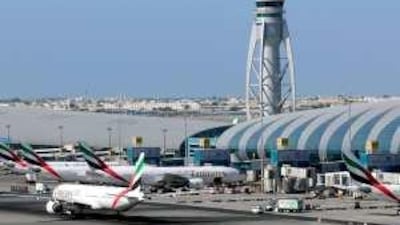Government-related entities in Dubai such as Emirates Airline will likely face higher borrowing costs in the wake of the Dubai World debt restructuring, Moody's Investor Services said. After Dubai World announced it would seek a six-month standstill agreement on repayment of a $3.52bn Islamic bond due later this month, analysts said international lenders may view Dubai companies as more risky than previously thought and shift focus to other emerging markets in the Gulf region. "Borrowing costs for all Dubai entities will go up going forward," said Philipp Lotter, the Middle East vice president for corporate finance at Moody's, the ratings agency. Mr Lotter said that funding the huge Emirates order book, which stands at US$50 billion (Dh183.65bn) worth of new aircraft over the next decade, over the longer term "is going to be a challenging exercise, after the recent events in Dubai".
Emirates is the largest and most profitable airline in the Middle East and is owned by the Investment Corporation of Dubai. Officials at the airline this week said they did not necessarily expect tighter lending conditions in the future, and had already secured financing for nine aircraft due for delivery by July next year at fixed margins. "It need not be the case that Emirates' borrowing costs will rise; this will clearly depend on the time horizon being considered," said Gary Chapman, the president of Emirates Group Services and of DNATA, its cargo arm. "The anticipated capital market structures are based on unconditional guarantees from the export credit agencies of either the US or France, and the pricing of those bonds should therefore not depend on circumstances in Dubai," he said.
The Dubai World issue has heightened concerns over the debt obligations of the emirate's state-owned companies after Dubai's finance chief said last week the debts were not backed by sovereign guarantees. "The Dubai World restructuring is a major about-face relative to the implicit support that had previously been assumed for government-related entities," wrote Richard Fox, the head of Middle East and Africa sovereign ratings for Fitch Ratings, in an editorial. Other companies could be affected, such as DP World, the ports operator, which will eventually need to tap capital markets to implement its long-term plans for international expansion once markets recover, analysts said. DP World declined to comment.
Emirates, because of its commitment for hundreds of new aeroplanes, will become one of the larger borrowers in Dubai over the next decade. It currently holds a gross debt of $9.9bn from previous aircraft financing deals as part of its bid to make Dubai a global hub for air travel. Mr Chapman said in October the company's cash flow was strong enough so that it "won't have any issue" with its lease repayments, and days later Emirates reported $205m in half-yearly profits. Analysts said it was less certain how the fallout will affect Abu Dhabi, where the state-backed carrier Etihad Airways recently placed an order for as many as 205 aircraft worth $43bn at list prices, and where the cost of insuring Abu Dhabi's sovereign debt rose significantly after the Dubai World restructuring announcement before falling days later.
"While borrowing costs are likely to rise throughout the region, particularly for corporates that do not benefit from government guarantees, the impact is likely to be less in Abu Dhabi than in Dubai, given the large wealth Abu Dhabi has at its immediate disposal," Mr Lotter said. igale@thenational.ae

